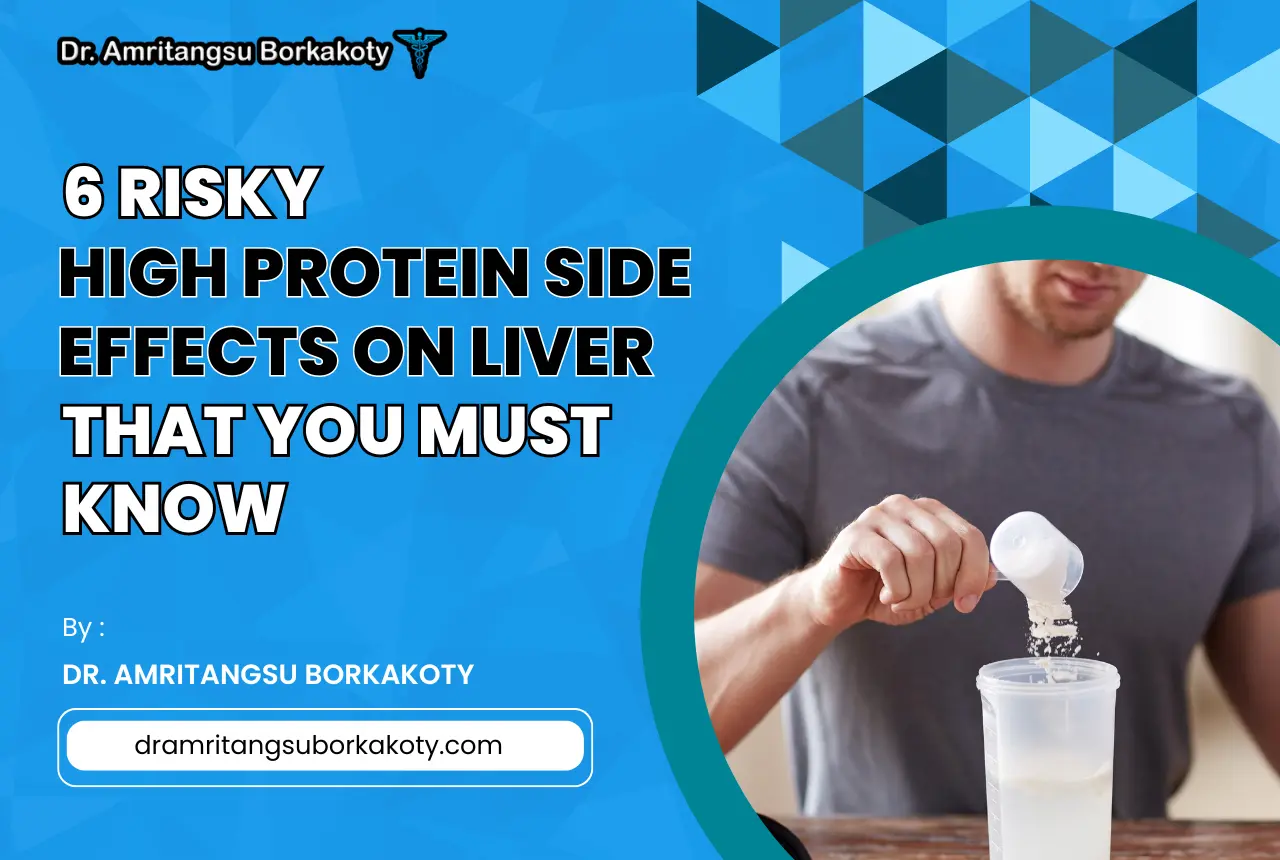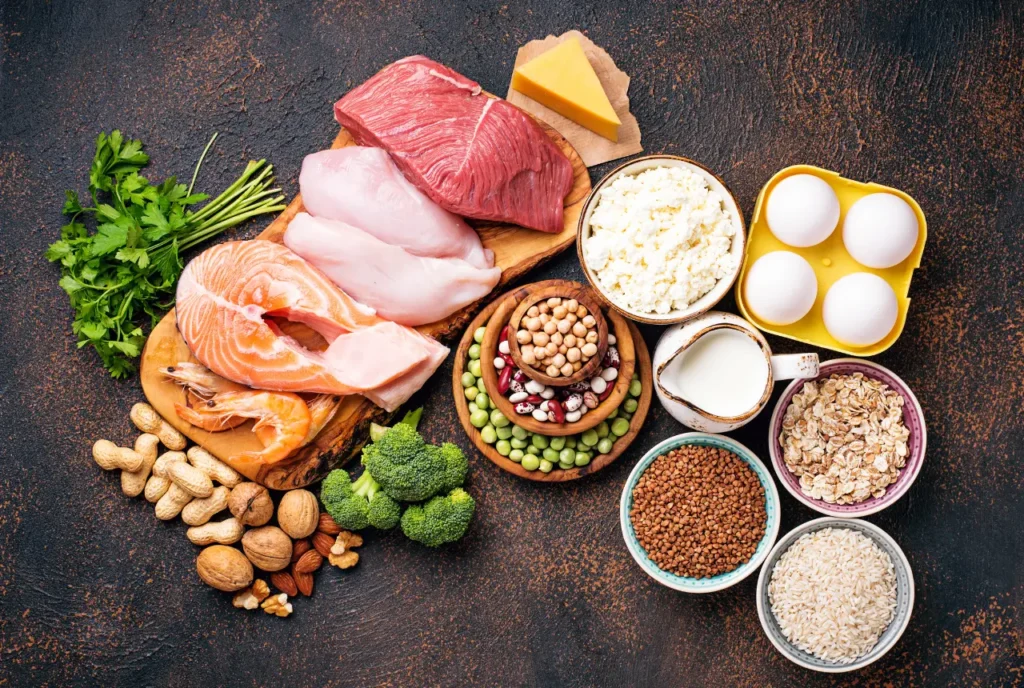
-
 Posted By Dr. Amritangsu Borkakoty
Posted By Dr. Amritangsu Borkakoty -
-
Comments 0
According to a study, Indians only get about 30 gms of protein from their diets daily. It is much less than the recommended quantity of 48 gms per day by the Indian Council of Medical Research (ICMR).
Another 2017 study revealed that 73% of Indians have protein deficiency while more than 90% are entirely unaware of the significance of protein consumption daily. While all of this points to the fact that protein is indispensable for the body, there are some high protein side effects on liver and other organs that we will discuss in this blog.
Usually, for healthy people, high-protein diets can be absolutely fine when followed for a short period. The protein aids in weight loss and muscle gain by making them feel fuller.
However, a high-protein diet can lead to a variety of health difficulties if followed over an extended time. Researchers are still investigating the long-term hazards of high-protein diets that restrict carbohydrates (carbs).
Some high-protein diets restrict carbohydrates so severely that you may not receive enough nutrients or fiber. This can lead to problems including poor breath, headaches, and constipation. Some high-protein diets allow red meat, processed meats, and other saturated fat-rich meals. These foods may raise your risk of heart disease.
6 Risky High Protein Side Effects on Liver That You Must Know
The liver is a hardworking organ responsible for processing protein. It breaks down protein into its building blocks, called amino acids, which are then used throughout the body. However, excess protein intake can overload the liver’s ability to handle this task.

Here are six potential consequences of exceeding your protein needs:
1. Increased Strain on Liver Function
When we consume protein, the liver converts excess amino acids into ammonia, a waste product. Normally, the liver efficiently removes ammonia through a process called the urea cycle. However, excessive protein intake can overwhelm this process, potentially leading to a buildup of ammonia in the blood.
This simply means that more than enough protein means more for the liver to process. This strains the liver and can lead to problems like liver failure and even cirrhosis.
2. Potential for Liver Damage
While some studies suggest a link between very high protein intake and liver damage, the evidence is limited, particularly for healthy individuals. More research is needed to understand the long-term effects. However, those with pre-existing liver conditions should be especially cautious about exceeding protein needs.
3. Kidney Strain and Increased Risk of Kidney Stones
The body excretes excess nitrogen, a byproduct of protein breakdown, through the urine. High protein intake can strain the kidneys and potentially increase the risk of kidney stones, especially for individuals prone to them.
4. Dehydration
Protein metabolism requires adequate water intake. When consuming a high-protein diet, it’s crucial to drink plenty of fluids to ensure the body can effectively process and eliminate protein byproducts. Dehydration can worsen the strain on your kidneys and liver.
5. Bone Health Concerns
The debate continues regarding the impact of high protein intake on bone health. Some studies suggest it might increase calcium excretion, potentially leading to bone loss. However, more research is required to confirm this link.
6. Gut Microbiome Disruption
The gut microbiome is a community of bacteria crucial for digestion and overall health. While the research is ongoing, some studies suggest high protein diets might alter gut bacteria composition. The long-term effects of this disruption remain unclear.
Who is Most at Risk for High Protein Side Effects?
Individuals with pre-existing liver conditions, such as cirrhosis or hepatitis, should be especially cautious about exceeding their protein needs. High protein intake can further burden their already compromised liver function. Consulting a doctor before embarking on a high-protein diet is crucial for those with liver conditions.
Other health factors can also influence protein needs and potential risks. Kidney function, age, and activity level all play a role. It’s important to consider these factors when determining your individual protein requirements.
Safe Protein Intake for Liver Health
The Recommended Daily Allowance (RDA) for protein is the minimum amount needed to maintain good health. However, individual needs can vary depending on factors like activity level, age, and overall health.
For healthy adults, the general recommendation is 0.8 grams of protein per kilogram of body weight per day. This translates to roughly 56 grams for a 70-kilogram person. However, athletes and individuals with active lifestyles might require slightly more protein.
Remember, this is just a general guideline. Consulting a doctor or registered dietitian can help you determine the optimal protein intake for your specific needs and health goals.
Symptoms of Protein Overload on the Liver
If you’re concerned about exceeding your protein needs, be aware of potential symptoms that might indicate protein overload. These include:
- Fatigue
- Loss of appetite
- Nausea
- Dark urine
- Yellowing of the skin or eyes (jaundice)
If you experience any of these symptoms, especially after significantly increasing your protein intake, consult a doctor to rule out any underlying health issues.
Can Protein Powder Damage Your Liver?

For healthy individuals consuming protein powder within recommended intake guidelines, the risk of liver damage is generally low. However, some low-quality protein powders might contain contaminants or unhealthy additives.
If you’re considering protein supplementation, choose a reputable brand and consult your doctor, especially if you have pre-existing health conditions. Remember, protein powder should be seen as a supplement, not a replacement for a balanced diet rich in whole-food protein sources.
Best Protein Sources for Liver Health and Detox After a High Protein Diet

The good news is you can get all the protein you need from a balanced diet rich in whole foods. Here are some excellent protein sources that are also beneficial for liver health:
- Lean Meats: Chicken, turkey, and fish are excellent sources of high-quality protein and essential nutrients like iron and B vitamins. Opt for lean cuts and grilling, baking, or poaching to minimize saturated fat intake.
- Eggs: A complete protein source packed with vitamins and minerals, eggs are a versatile and affordable option. Enjoy them boiled, poached, or scrambled, and incorporate them into various dishes.
- Legumes: Beans, lentils, and chickpeas are fantastic plant-based protein sources. They’re also rich in fiber and antioxidants, promoting overall gut health and potentially aiding liver function.
- Low-Fat Dairy: Greek yogurt and cottage cheese provide protein, calcium, and probiotics, which can benefit gut health and potentially support liver function indirectly. Choose low-fat options to minimize saturated fat intake.
Now, the concept of “liver detox” is a bit of a misconception. The liver is a remarkably self-sufficient organ that naturally detoxifies the body by processing and eliminating waste products. However, you can certainly support your liver’s natural function through healthy lifestyle practices:
- Balanced Diet: A balanced diet rich in fruits, vegetables, and whole grains provides essential nutrients that optimize liver function.
- Exercise: Regular physical activity improves overall health and can help manage weight, which can indirectly benefit your liver.
- Adequate Sleep: When you sleep, your body goes into repair mode, allowing your liver to function optimally.
- Limit Alcohol and Substance Abuse: Excessive alcohol consumption and exposure to toxins can overburden the liver. Practicing moderation with alcohol and avoiding unnecessary toxins like certain medications and environmental pollutants can support your liver health.
Conclusion
While high protein intake can offer benefits for athletes and those with specific dietary needs, exceeding your requirements can potentially strain your liver and kidneys. The key is moderation and personalization. The above-mentioned are some main and often ignored risks associated with high-protein side effects in the liver.
Remember, a balanced diet rich in whole-food protein sources is the best way to meet your protein needs and support overall health, including your liver. If you’re unsure about your protein requirements or have concerns about a high-protein diet, consult a doctor or registered dietitian for personalized guidance. By making informed choices and prioritizing a balanced approach, you can achieve optimal health without compromising your liver function.
Recent Posts
- Common Causes of Stomach Ulcers and Effective Treatment Options
- Early Symptoms of Liver Damage: How to Spot the First Warning Signs Before It’s Too Late
- Best Treatment for Hepatitis B and C: Your Complete Guide to Symptoms, Care, and Prevention
- How to Reduce Liver Inflammation Fast: 5 Proven Tips for Rapid Liver Recovery
- Why You Shouldn’t Ignore NAFLD: 5 Shocking Health Risks You Need to Know



